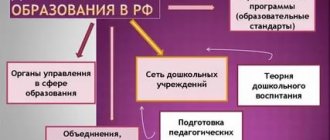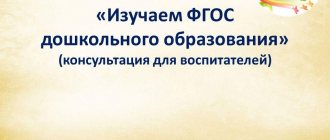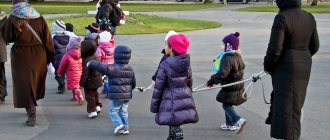Article "Preschool Education Trend"
MODERN DEVELOPMENT TRENDS IN PRESCHOOL PEDAGOGY.
The ongoing transformations in the preschool education system are due to development. An objective need for adequate social development and development of the educational system, which is reflected in the awareness of the pedagogical community of the need for significant changes in the previous course of functioning of the institution. The main mechanism for optimizing the development of the preschool education system is the search and development of innovations that contribute to qualitative changes in the activities of preschool educational institutions (PSE), which is expressed in the transition of institutions to development mode
Today, we can confidently state the fact of the formal or substantive transition of most preschool educational institutions into search mode. This regime is transitional on the path to qualitative changes and the transfer of preschool educational institutions to development mode. Another aspect is related to the qualitative characteristics of this transition: the extent to which the innovations implemented in the preschool educational institution correspond to the urgent needs and opportunities for its development, satisfy the interests and needs of children, parents, teachers, and contribute to the achievement of sustainable high development indicators. Therefore, the issue of identifying current problems in the development of preschool educational institutions becomes the most important.
The analysis of existing concepts, projects and programs in the field of preschool education allows us to identify a number of basic trends in the development of the system:
- humanization
— determines the primacy of the personal development of subjects (parents, teachers, children), the centering of the educational process on the values of human development, the orientation towards the comprehensive and harmonious development of personality, the transfer of the subject to the position of self-managed development in the process of revealing essential forces.
Humanization of education is a process aimed at developing the individual as a subject of creative activity, which “constitutes the most important characteristic of the lifestyle of teachers and students, presupposing the establishment of truly human (humane) relationships between them in the pedagogical process” and is a key component of new pedagogical thinking, focused around the idea of personality development. The leading direction of humanization of education
is considered to be
“self-determination of the individual in culture”
, its introduction to national and cultural traditions, enriched with the human content of humanization - increased attention to the personality of each child as the highest social value of society, an orientation towards the formation of a citizen with high intellectual, moral and physical qualities; - democratization
associated with the expansion of rights and powers of participants in the educational process, the focus on meeting the individual needs and requests of subjects. This involves creating the prerequisites for the development of activity, initiative and creativity of students and teachers, their interested interaction, as well as broad public participation in the management of preschool education;
- diversification
is defined as the necessary and sufficient variety of types and types of institutions, educational services and approaches to their implementation in order to satisfy the diverse and diverse needs of participants in the educational process in preschool educational institutions.
The projection of the identified grounds onto the educational process in a preschool educational institution presents all its subsystems in a new way. In this regard, a number of basic principles emerge that ensure the implementation of these directions in the process of development of the preschool educational institution and its participants:
— the principle of human conformity (unity of cultural and natural conformity); — the principle of integrity of the pedagogical process and complexity of goals; — the principle of activity and equal partnership in the pedagogical interaction of all subjects of the pedagogical process.
Modernization of management of a preschool educational institution is associated with a variety of types and technologies of management, ensuring a comprehensive and comprehensive impact of the management system on the managed system of the preschool educational institution within the framework of motivational and program-target approaches, motivational program-target management, co-management, reflexive management and self-government. Indicators of qualitative transformation of preschool educational institutions management are, first of all, new principles:
— democratization and humanization; — consistency and integrity of management; — centralization/decentralization; tactical and operational levels of management and the corresponding types of management (traditional, reflexive, self-government); — unity of command and collegiality; — objectivity and completeness of information in making management decisions.
At the present stage, there are a number of problems in the development of the innovation process in preschool educational institutions, in particular, such as:
- combining innovative programs with existing ones in preschool educational institutions;
- the split in the teaching community and the coexistence of representatives of different pedagogical concepts;
- inconsistency of new types of preschool educational institutions with the expectations and requirements of parents;
- the need for new scientific and methodological support for ongoing educational activities;
- the need for new teaching staff;
- adaptation of innovations to new conditions;
- the problem of change, optimization, replacement of innovations, the ability to get rid of outdated and pedagogically inappropriate things in a timely manner;
- the problem of reproducing innovativeness and creating conditions conducive to this.
Based on an analysis of existing concepts for the development of preschool education, the leading directions of innovation in preschool educational institutions include the establishment of humane subject-subject relations, the development of creative capabilities and intellectual strength of children; individual creative development of the child’s personality; development of communication between practitioners and researchers in the field of innovation.
Changing the paradigmatic attitudes of modern education allows us to consider the development of a child as a process of his self-development, where education acts as a form of mental development of a preschooler, and development standards are transformed into an understanding of development as a norm.
Accordingly, the main trends in the development of preschool education are associated with the goal of creating a full-fledged space for the development of the child and organizing comprehensive support for the individual development of preschool children. A rich and safe life experience, eventfulness, connection between an adult and a child in the educational process, the priority of developmental and educational tasks in preschool educational institutions contribute to the favorable socialization of children and lay the basic competencies of a preschooler in mastering the world and appropriating culture.
In order to coordinate actions for the development of the preschool education system in accordance with the instructions of the President of the Russian Federation of December 10, 2005 No. Pr-2065, a Set of measures for the development of preschool education in the Russian Federation for 2007-2012 was developed.
The set of measures provides for the implementation of measures for the development of preschool education at all levels - federal, regional and municipal - in two main areas: ensuring the accessibility of preschool education and ensuring its quality. Currently, as part of the implementation of the Set of Measures, work is underway to expand the diversity of preschool educational institutions in order to most fully satisfy the needs of the population of the Russian Federation in preschool education services. It is planned to regulate the activities of new types of preschool educational institutions: a kindergarten for young children, a kindergarten for pre-school preparation. In addition, in terms of the normative consolidation of free preschool education, a draft resolution of the Government of the Russian Federation has been developed and submitted to the Government of the Russian Federation, approving a list of types of preschool services educational institutions, implemented free of charge. In order to improve the financial status of workers in the preschool education system, preparatory work was carried out to introduce new wage systems (NSTS) into preschool educational institutions in 2009–20012, the principles of which were tested in 2007–2008 as part of comprehensive education modernization projects. Methodological recommendations on the introduction of NSOT have been sent to the constituent entities of the Russian Federation. As part of the Set of Measures, work is currently underway, together with the Ministry of Regional Development of Russia, to review and amend urban planning standards, taking into account the provision of integrated residential development areas with developed infrastructure, primarily preschool education institutions. Also, among the activities of the Set of Measures, the following will be consistently implemented: development of federal state requirements for the structure of the basic general education program of preschool education; development of federal state requirements for the conditions for the implementation of the basic general education program of preschool education. Further prospects for the development of the preschool education system are also provided within the framework of the implementation of the Concept of Demographic Policy of the Russian Federation for the period until 2025. The most significant event is the development of regional programs for the development of the preschool education system as an integral part of the educational system of the constituent entities of the Russian Federation. The Russian Ministry of Education and Science has developed and sent to the constituent entities of the Russian Federation methodological recommendations for the development of regional preschool education systems. It should be noted that in order to more fully meet the needs of the population for preschool education services, the constituent entities of the Russian Federation currently have sufficient regulatory powers to introduce new organizational forms of preschool education. So-called “family kindergartens”, home-based or tutor groups, family clubs, social playrooms can currently be organized as structural divisions of municipal or state preschool educational institutions, which will have to provide these forms with qualified personnel, provide psychological and pedagogical support for their activities and control behind it in order to ensure a sufficiently high quality of services provided. A special direction in the development of preschool education in the Russian Federation in the near future will be the creation of a system of early development of children aged from birth to 3 years. The importance of this particular direction of development of preschool education is due to several reasons.
Firstly, at present, the majority of children in need of places in preschool educational institutions are children under the age of 3. Secondly, investing in the early development of children (especially children from disadvantaged and low-income children), on the one hand, serves the goals of ensuring social justice and equal opportunities for all, on the other hand, it contributes to increasing productivity and efficiency in the economy and in society as a whole. First of all, this work on the early development of children should be carried out in preschool educational institutions, in which there are mothers under the supervision, as well as short-stay groups, in which qualified teachers work together with children to regulate various models of advisory qualified staff of teachers. The greatest demand now exists for groups for children from 1.5 years old. However, parents are interested in the child gradually getting used to kindergarten so that adaptation is less painful. In this regard, there is a need for more active development of adaptation groups based on short-term stays, where the mother could bring the baby for 2-2.5 hours 2-3 times a week. Experience in organizing club forms of work, where children play in the presence or assistance of parents in raising preschool-aged children and their parents. At the same time, it is necessary to develop normative relationships and divisions of strategic
Reggio pedagogy
Italian technology, based on the ideas of Vygotsky and Maria Montessori. The author of the technology is Loris Malaguzzi. Malaguzzi believed that the child had at least 100 languages, but 99 of them were stolen. Much in a child’s life happens at the direction of adults, even holidays. The main postulate is that the environment must meet the needs and capabilities of the child.
What principles does it work on?
- A separate program includes space for the child. He can even retire and do only what he wants.
- The parent is completely immersed in the work of the kindergarten. He sometimes goes to kindergarten with the child, helps, and becomes a partner.
- There is no assessment and control - no final tests. The Reggio teacher uses observation, records the results of the child’s work, but does not give an assessment.
What goals does the child achieve?
- Learns partnership. Children are taught to work in groups so that they learn to negotiate, cooperate, and get used to the fact that they are “not alone.”
- Studies culture. Classes are not limited to the kindergarten environment: children are taken on excursions, helped to understand relationships between people, the rules of society, and traditions.
- Learns free choice. The child himself chooses the pace of classes and the materials with which he will play.
What should a teacher be like?
The teacher must follow six rules:
- Respect the child and look him in the eye.
- Explain the rules and ask a question. Only this way, and not the other way around.
- Not “wrong”, but “different”.
- Offer choice and don't rush.
- Learn in any situation.
- Fantasizing is more important than reading.




